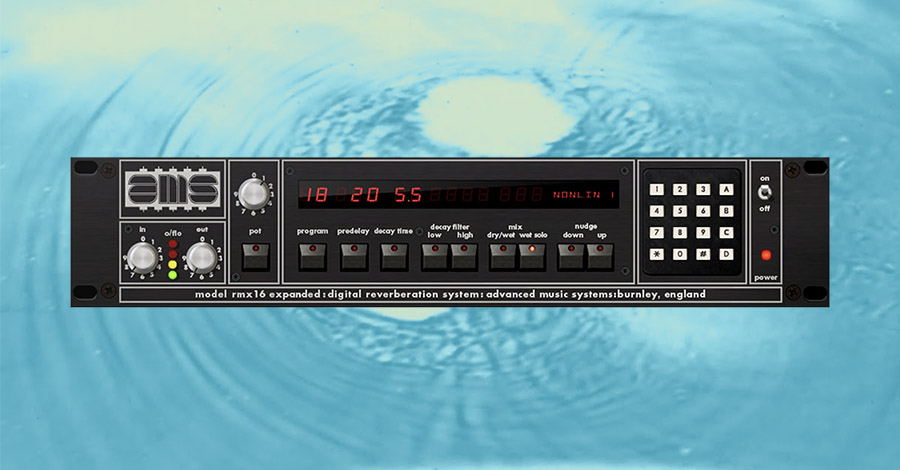
- #VALHALLA VINTAGE VERB MOST LIKE LEXICON 224 SOFTWARE#
- #VALHALLA VINTAGE VERB MOST LIKE LEXICON 224 CODE#
- #VALHALLA VINTAGE VERB MOST LIKE LEXICON 224 DOWNLOAD#
- #VALHALLA VINTAGE VERB MOST LIKE LEXICON 224 CRACK#
- #VALHALLA VINTAGE VERB MOST LIKE LEXICON 224 WINDOWS#
#VALHALLA VINTAGE VERB MOST LIKE LEXICON 224 CRACK#
ValhallaDSP’s newest VST plugin, VintageVerb crack (VST / AU / RTAS), is a nostalgic take on the whimsically dried gear reverbs of old times. This version of Valhalla VintageVerb crack works as an RTAS, AAX, AU and a VST plugin format.
#VALHALLA VINTAGE VERB MOST LIKE LEXICON 224 WINDOWS#
I paid a total of $180 for the two, and you can do better than that with some patience and a little risk buying secondhand. ValhallaDSP Valhalla VintageVerb Crack is a postmodern vintage reverb VST plugin for Windows and macOS.
#VALHALLA VINTAGE VERB MOST LIKE LEXICON 224 SOFTWARE#
You can pick them up cheap on KVR with a little risk (I’ll be selling mine, but prob to someone I know - I have 2 more licenses from an izotope bundle).Īnd, once again, the Exponential guy, Michael Carnes, developed the Lexicon software before founding his own company. In fact the default preset is a Lex hall called “famous hall”. R4 is the companion - more lush (but not syrupy like seventh heaven), can modulate the early reflections and the tail, gated, etc. Nimbus is very clean and can be very realistic, but you can dirty it up a bit with Warp (it also comes with all Phoenixverb presets and tons of others). Valhalla DSP has released ValhallaSupermassive, a freeware delay effect in VST. It includes Valhalla Delay, Valhalla Vintage Verb and many others dope VST. Valhalla Room Crack Windows, I would like to write some blog articles that explain.
#VALHALLA VINTAGE VERB MOST LIKE LEXICON 224 DOWNLOAD#
Nimbus and R4 are my favorite reverbs (along with Sonsig-A). Valhalla Free Plugins Valhalla Room Free Download Valhalla Audio Plugins. Mind you it isn't reverb, but sound design tool that seems to be based around delays, reverbs, lfos and filters.) (Might want to demo Excalibur as well, a steal at $10. Just remember its iLok, and you only get one license. At its heart are nine mostly Lexicon-inspired reverb algorithms to choose from, covering the usual array of halls, plates, rooms and spaces, as well as a few more esoteric designs. One at a time I'm assuming.Īnyway I'd demo Phoenixverb to see what you think. ValhallaDSPs latest plugin, VintageVerb (VST/AU/RTAS), is a nostalgic take on the curiously crusty hardware reverbs of yesteryear. That said, seeing that Plugin Boutique had PhoenixVerb for $10 last week, have Exaclibur for $10 this week, I'm going to assume that Nimbus and or R2 will have some crazy sale too over the next few weeks too. If they bought their algorithms it's for a very good reason. Some of the gear that is offered with Altiverb include classic reverbs like the Lexicon 480 and 224, along with the AMS RMX 16, EMT 240, and much more. Even thought they've become aggressive with their sales lately Izotope are super smart developers. From epic concert halls to samples of classic and vintage gear, Altiverb is probably the most complete reverb and effects package available on the market. (Not to mention it sounds great.) The other thing I'll add is that Izotope bought them out for a reason. It's really great at creating a sense of depth.

I, like many love Valhalla, to my ears it sounds as good and in some ways better.


For most users it’s a cheaper, more flexible and more convenient alternative to the original hardware.I bought PhoenixVerb last week and it's really good.
#VALHALLA VINTAGE VERB MOST LIKE LEXICON 224 CODE#
Universal Audio’s Lexicon 224 Reverb plugin uses exactly the same algorithms and control processor code found in the final iteration of the 224. However, it’s impossible to ignore the fact that software emulations of digital reverb units are all but indistinguishable from the real thing. More affordable Lexicon units such as the later PCM range offer a similar sound at a lower price point. The iconic status of the 224 means that a good working unit still commands a relatively high price, typically in the region of £1,500. In some cases (such as with the Lexicon 224/224XL/PCM70 reverbs), only a few delay lines in a reverb algorithm are modulated. That’s not to say that they didn’t sound good indeed, with its 12-bit AD and DA conversion (again, the highest quality available at the time), the 224 offered exceptionally long, clear reverb tails. Before the advent of convolution reverbs and more advanced forms of algorithmic modelling, the standard was for all digital reverb units to be based on relatively simplistic delay-based algorithms (albeit running on what was at the time cutting-edge digital signal processing hardware). The 224 in particular marks an early high point for algorithmic reverb. Some of the smoothest, most useable reverb algorithms ever produced


 0 kommentar(er)
0 kommentar(er)
